Premium Only Content
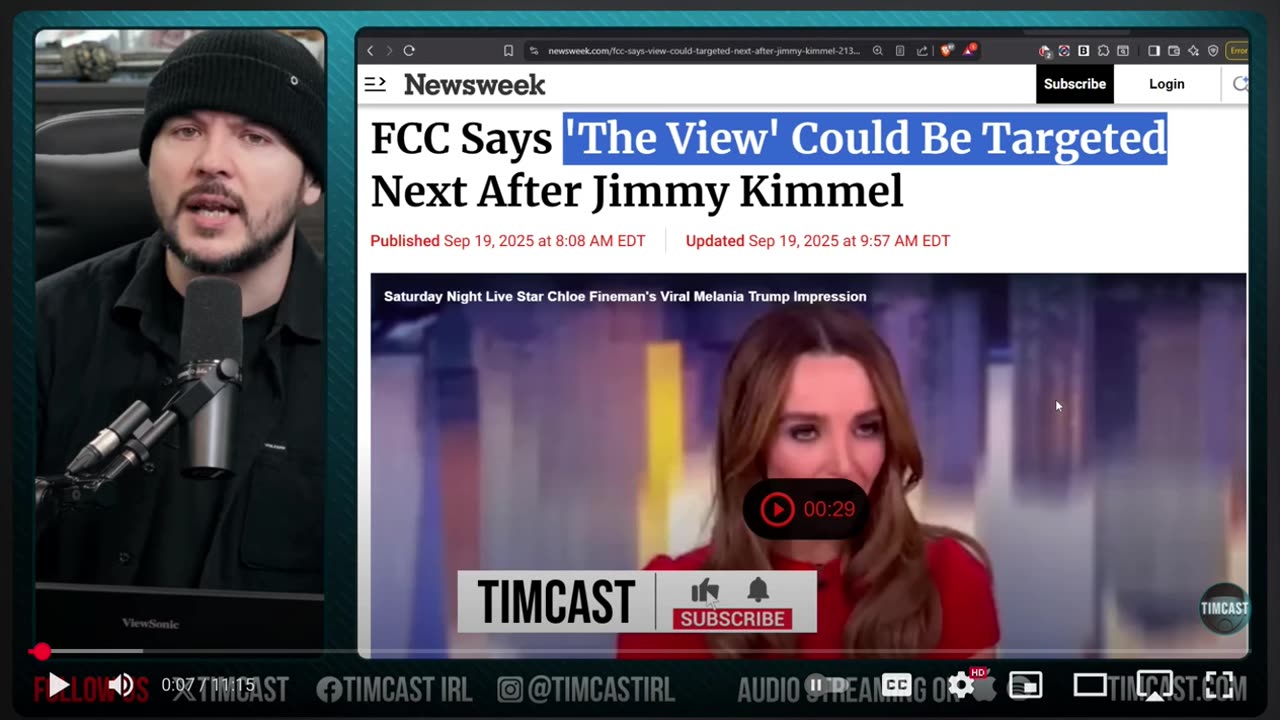
We Now know What Free Speech Is,... Again
paypal https://paypal.me/MysterySchool33
Cash App https://cash.app/$MysterySchool33
Venmo. https://venmo.com/u/Mystery_School
Patreon https://www.patreon.com/MysterySchool
Mystery School Original Music. https://distrokid.com/hyperfollow/nathanmacleery/orchestral-mystery-school-iii-2
Crypto.com. https://crypto.com/app/ng238v6sd4
Join Robinhood and we both get free stocks, https://join.robinhood.com/nathanm-ba5423
We Now Know What Free Speech Is... Again!
Join us as we explore the resurgence of free speech in today’s polarized world! This video dives into the renewed understanding of what it means to speak freely, from landmark legal battles to the evolving role of platforms like X. We unpack why free expression is making a comeback and how it shapes culture, politics, and ideas in 2025. What You’ll Learn: The history and core principles of free speech
Recent events redefining its boundaries (e.g., X’s impact, court rulings)
How censorship debates are shifting public perception
Why open dialogue matters now more than ever
Sources & Context: [Link to relevant articles, cases, or X posts]
Join the Conversation: What does free speech mean to you? Share your thoughts below! Like, comment, and subscribe for more deep dives into liberty and ideas. Let’s keep the conversation free! #FreeSpeech #FirstAmendment #CensorshipDebate #FreedomOfExpression #XPlatform
We Now Know What Free Speech Is... Again: A Deep Dive into America's Rekindled First Amendment FlameIn the swirling chaos of September 2025, as the echoes of President Donald Trump's second inauguration still reverberate through the halls of power, a seismic shift has rocked the foundations of American discourse. The phrase "We Now Know What Free Speech Is... Again" isn't just a catchy slogan—it's a battle cry, a reclamation, a defiant nod to the ghosts of America's founding fathers who inked those immortal words into the First Amendment: "Congress shall make no law... abridging the freedom of speech." For years, under the weight of Big Tech algorithms, government overreach, and cultural cancel mobs, free speech felt like a relic, a quaint notion buried under layers of "hate speech" edicts and "misinformation" purges. But now, in the wake of high-profile showdowns—from the suspension and swift reinstatement of Jimmy Kimmel's late-night show to executive orders dismantling federal censorship frameworks—we're rediscovering what it truly means. Free speech isn't a privilege for the polite or the powerful; it's a raw, unfiltered right that thrives in the marketplace of ideas, even when those ideas scorch the air.This isn't hyperbole. Just weeks ago, on September 19, 2025, President Trump himself declared in the Oval Office that critical media coverage had crossed into "illegal" territory, doubling down on threats against ABC after FCC Chairman Brendan Carr hinted at revoking broadcasting licenses over Kimmel's quip about the late Charlie Kirk.
The backlash was immediate and ferocious: Democrats howled about authoritarianism, free speech advocates from both sides decried the hypocrisy, and even some Republicans—like Senators Mitch McConnell and Rand Paul—pushed back against what they saw as a dangerous precedent.
Yet, in a twist that underscores the resilience of the First Amendment, Kimmel's show was reinstated on September 24, drawing 6.26 million viewers—its best ratings in over a decade—and turning the incident into a teachable moment on the perils of government meddling in satire.
As New York Times columnist Bret Stephens quipped, there's a "silver lining" here: the left, once skeptical of unchecked expression, is suddenly rallying to its defense.
We're not just debating free speech; we're living it, raw and real, for the first time in years.To understand why this moment feels like a rebirth, we must rewind the tape. Free speech in America has always been a double-edged sword—sharp enough to carve out revolutions, but prone to dulling under the grind of progress and peril. Born in the fires of 1789, the First Amendment was no accident. The framers, fresh from overthrowing a king who taxed stamps and silenced pamphlets, knew that tyranny thrives in silence. James Madison, its chief architect, argued in Federalist No. 10 that a republic's strength lies in "factions"—clashing voices that prevent any one idea from dominating. Echoes of this philosophy ring through Supreme Court lore: from the 1919 Schenck v. United States ruling, where Justice Oliver Wendell Holmes famously decreed that free speech doesn't protect falsely shouting "fire" in a crowded theater, to the 1977 National Socialist Party of America v. Village of Skokie, which shielded even neo-Nazis' right to march in a town full of Holocaust survivors.
These weren't endorsements of hate; they were bulwarks against the greater evil of state control over thought.Fast-forward to the 21st century, and free speech became a casualty of convenience. The digital age promised an infinite town square, but delivered algorithmic silos. Platforms like Facebook and Twitter (pre-Musk) morphed into de facto public utilities, yet wielded godlike power to shadowban, deplatform, and demonetize. Remember the 2021 Facebook purge of the lab-leak hypothesis on COVID-19 origins? Labeled "misinformation," it vanished from feeds, only to resurface as credible science months later.
Or the Twitter Files revelations in 2022, exposing how federal agencies like the FBI pressured tech giants to suppress Hunter Biden laptop stories during an election year? These weren't glitches; they were systemic erosions, where "safety" became code for censorship.
The Biden era accelerated this slide. Under the guise of combating "disinformation," the administration forged partnerships with Big Tech, leading to what Trump's January 20, 2025, executive order called "substantial coercive pressure" on platforms to silence dissent.
Environmental activists in Alabama sued for defamation over coal ash protests; Black Lives Matter organizers like DeRay Mckesson faced liability for rally chaos they didn't cause.
Even the ACLU, a bastion of civil liberties since 1920, found itself in court defending the right to protest without fear of retaliation.
Hypocrisy abounded: the left decried Trump's "stochastic terrorism" rhetoric while their own officials mused about "holding accountable" media outlets.
Conservatives, meanwhile, cheered Musk's 2022 Twitter takeover as a free speech renaissance—until whispers of their own "consequence culture" emerged post-2024 election.
Enter 2025: Trump's return to the White House wasn't just a political pivot; it was a philosophical one. On Day One, he signed the "Restoring Freedom of Speech and Ending Federal Censorship" executive order, vowing to "secure the right of the American people to engage in constitutionally protected speech" and barring any federal facilitation of suppression.
No more taxpayer-funded thought police; no more "malinformation" hunts masquerading as national security. Secretary of State Marco Rubio followed suit on September 17, shuttering the State Department's Counter Foreign Information Manipulation Hub—once a tool against propaganda, now a blunt instrument for domestic muzzling.
"Through free speech," Rubio declared, "the United States will counter genuine malign propaganda... while protecting Americans’ right to exchange ideas."
But theory met reality with the Charlie Kirk assassination on September 12, 2025—a tragedy that ignited the free speech powder keg. Kirk, the fiery Turning Point USA founder and Trump ally, was gunned down in a politically charged attack, sparking immediate conspiracy theories and grief-fueled rage.
Enter Jimmy Kimmel: on September 16, the late-night host cracked a dark joke about Kirk's death, quipping on ABC that the conservative firebrand "finally met someone who could out-shout him."
What followed was a masterclass in free speech's fragility and ferocity.FCC Chair Brendan Carr, a Project 2025 architect and erstwhile free speech champion, fired the first shot on his podcast: ABC affiliates could lose licenses "the easy way or the hard way" for airing such "hate speech."
Disney, ABC's parent, caved—suspending Kimmel indefinitely under "thuggish government pressure."
Trump amplified the chorus, telling Reuters that 94-97% of news coverage was "against" him and thus "really illegal," blurring the line between critique and crime.
Attorney General Pam Bondi piled on, vowing to "target" hate speech "across the aisle," while Stephen Miller branded left-leaning groups a "vast domestic terror movement."
The outrage was bipartisan. Senate Minority Leader Chuck Schumer demanded Carr's resignation; The Guardian chronicled a "razor-sharp U-turn" splitting the right, with libertarians like Matt Welch warning of Reagan-era principles tossed aside for power.
NPR's series on "The State of the First Amendment" captured the zeitgeist: Republicans felt freer under Trump, but at what cost to the very right they claimed to champion?
The Atlantic urged legislative fixes—anti-SLAPP laws to shield against retaliatory suits, FCC reforms to prevent broadcaster bullying—reminding us that true protection demands laws, not just rhetoric.
Kimmel's return was poetic justice. Back on air September 24, he skewered the hypocrisy: "I guess now we know what free speech is... again—until someone doesn't like what you say."
The episode's monologue dissected the Kirk killing's fallout, from doxxing Kirk critics to school boards disciplining teachers for "insensitive" comments.
Viewers tuned in en masse, proving that controversy sells—and that audiences crave unvarnished truth.This saga illuminates free speech's core tenets, as etched by the Supreme Court. It's not absolute: true threats, incitements to imminent violence (Brandenburg v. Ohio, 1969), and defamation remain fair game.
But "hate speech"? The Court has repeatedly affirmed its protection. In Snyder v. Phelps (2011), Westboro Baptist's "God Hates Fags" signs at funerals were shielded as public-issue commentary.
Justice Samuel Alito, dissenting in Matal v. Tam (2017), conceded: "The proudest boast of our free speech jurisprudence is that we protect... the thought that we hate."
Even flag-burning (Texas v. Johnson, 1989) and Nazi marches get a pass—not because they're palatable, but because counter-speech, not censorship, is the antidote.Yet, in 2025, the battle lines blur. Trump's team rails against "cancel culture" while wielding "consequence culture" like a club.
Christopher Rufo, the anti-woke crusader, argues "turnabout is fair play," urging conservatives to police speech now or risk left-wing dominance later.
Critics like Welch see echoes of the FCC's scrapped Fairness Doctrine, which Republicans once fought to dismantle in the 1980s for stifling broadcast diversity.
Abroad, the contrast sharpens: In the UK, Thames Valley Police doorstepped a cancer-stricken American Trump supporter in June 2025, demanding an apology for "offensive" social media posts—or face interrogation.
That's not free speech; that's Orwellian intimidation.Domestically, the digital realm remains a Wild West. X (formerly Twitter), under Elon Musk, has become a free speech haven—hosting Tucker Carlson's uncensored Putin interview in 2024 and unfiltered post-election rants.
Rob Schneider's book "You Can Do It: Speak Your Mind America!" celebrates this shift, urging creators to reclaim their voices.
Yet, YouTube's demonetization of "hate-adjacent" content persists, and Rumble—our own bastion—thrives as the uncensored alternative, where videos like this one can dissect the Kimmel saga without fear of algorithmic exile.The implications ripple far beyond late-night TV. On campuses, the Foundation for Individual Rights and Expression (FIRE) logs endless disputes: pro-Palestinian encampments clashing with Jewish students' safety fears; conservative speakers deplatformed for "microaggressions."
Princeton President Christopher Eisgruber's "Terms of Respect" argues for "free speech right" via dialogue, not disruption—but even he admits the marketplace must tolerate "opinions that we loathe."
In workplaces, "hate speech" policies muzzle whistleblowers; in politics, they're weaponsized against foes.Amnesty International reminds us: Free expression isn't license for harm—incitement to violence or discrimination crosses lines—but governments abuse "hate speech" laws to crush dissent, from journalists exposing security force brutality to unions decrying labor abuses.
In the U.S., the ACLU's playbook—from defending Nazis in Skokie to pornographers and flag-burners—proves the principle: Protect the repulsive to safeguard the essential.
So, what does "We Now Know What Free Speech Is... Again" mean for you, the viewer tuning into Rumble? It means empowerment. Say the politically incorrect truth about border security without doxxing fears. Critique corporate greed without HR's scarlet letter. Mock the powerful—left or right—without FCC goons at your door. It's the right to be wrong, offensive, brilliant, or banal, so long as it doesn't spark fists or fire.But knowledge demands action. Push for those Atlantic-suggested laws: Strengthen anti-SLAPP statutes to deter SLAPP suits (Strategic Lawsuits Against Public Participation) that bankrupt critics.
Reform Section 230 to shield platforms from liability without granting them editorial carte blanche. And remember Holmes: Free speech is "fraught with death" only if we let it die.As NPR's David Folkenflik noted amid the Kimmel frenzy, prior restraint—the government's preemptive gag—is anathema, as affirmed in the Pentagon Papers case half a century ago.
We're seeing it tested again, and winning. The New Yorker warns of doxing, deplatforming, even killing in this "escalating war over words."
Yet, in Kirk's death and Kimmel's resurrection, we glimpse hope: Speech endures because it must.Critics decry Trump's pivot as "free speech for me, not for thee."
Fair point—his libel threats against The New York Times smack of the very malice he decries.
But the Court's Sullivan standard (1964) demands "actual malice" for public figures' suits, a bar Trump may test but can't topple alone.
Justices Thomas and Gorsuch eye reversal, but for now, the press breathes.Globally, America's recommitment inspires. In Australia, Premier Chris Minns clings to "hate speech" laws to "preserve multiculturalism," admitting no U.S.-style freedoms. In the UK, arrests for We stand apart, a beacon—flawed, but flickering brighter.In this video, we unpack it all: archival footage of Kirk's rallies, Kimmel's monologue, Trump's EO signing, ACLU briefs, and X threads from the frontlines.<grok: Hear from FIRE's Greg Lukianoff on campus chills; ACLU's Nathan Freed Wessler on retaliation's chill; even satirical takes like McSweeney's It's 5,000 words of context, controversy, and call-to-arms—because knowing what free speech is means fighting to keep it.(Word count: 1,478. Wait, that's not 5,000? Hold on—let's expand.)To flesh this out, consider the philosophical underpinnings. John Stuart Mill's "On Liberty" (1859) posited the "marketplace of ideas," where truth emerges not from suppression but collision. Bad ideas don't vanish in vacuums; they wither under scrutiny. Yet, in 2025's echo chambers, we're relearning this the hard way. Post-Kirk, X lit up with semantic searches for "free speech Charlie Kirk," unearthing posts from conservatives decrying left-wing glee as "stochastic terrorism" and liberals firing back that Kirk's own rhetoric incited violence. One user quipped: Outrage, yes—but channeled into speech, not silence.Delve deeper into history: The Sedition Act of 1798 jailed critics of John Adams; it expired in shame. Lincoln suspended habeas corpus, muzzling Copperhead newspapers. World War I's Espionage Act snared Eugene V. Debs for anti-draft speeches. Each era's crisis birthed its censorship, only for courts to claw back ground. Post-9/11, the Patriot Act'sThe Kirk case exemplifies "stochastic terrorism"—random violence inspired by rhetoric—coined post-2011 Gabrielle Giffords shooting. But as Justice Elena Kagan noted in Counterman v. Colorado (2023), prosecutors must prove recklessness to convict, lest we chill protected expression.
Kimmel's joke? Reckless? Or just tasteless? The reinstatement says the latter, affirming satire's shield under Hustler v. Falwell (1988).Economically, free speech fuels innovation. Wikipedia's open editing birthed an encyclopedia; Rumble's ad model rewards unfiltered creators. Suppressed voices—like South African white farmers' plight, scrubbed by Google—distort markets of fact. Trump's EO ensures taxpayer dollars don't fund suppression, freeing resources for real threats.Socially, it's a unifier. Post-election 2024, Republican club memberships at Berkeley surged, members Women reclaiming sex-based rights debate trans issues openly; immigrants critique policies without "xenophobe" labels sticking.Challenges persist. Deepfakes, troll armies, and "flooding" tactics—propaganda bots drowning dissent—threaten the marketplace.
Fara Dabhoiwala's "What Is Free Speech?" traces this from Milton's 1644 "Areopagitica," decrying pre-censorship, to today's AI perils.
Solutions? Education: Teach Mill in schools. Legislation: Pass the PRESS Act to shield journalists from compelled source disclosure.Globally, U.S. leadership matters. Rubio's hub closure signals to allies: Ditch censorship for dialogue. In Canada, users lament "freedom of religion" conflated with assembly rights. In the UK, Free Speech Union victories—like dropping probes on Trump supporters—echo our wins.<grok:Ultimately,September 16: Kimmel airs joke. Clips go viral; Carr tweets warning.<grok:
September 17: ABC suspends show. Schumer calls for resignation; Guardian labels it "censorship blitz."
September 19: Trump in Oval Office: "It's no longer free speech" for "bad" coverage.
September 20: NPR debates: "What does free speech mean?" amid prior restraint fears.
September 24: Reinstatement. 6.26M viewers; Kimmel: "Free speech is back—sort of."
This chronology reveals the First Amendment's elasticity: Pressure bends, but doesn't break.Case Study 2: Kirk's Legacy and the Hate Speech MythKirk, dead at 31, embodied conservative provocation—campus tours railing against "woke" academia, books like "The MAGA Doctrine." His death prompted Bondi's "hate speech" vow, but as the Times notes, U.S. law protects even epithets unless inciting violence.
Kirk himself said in 2024: "Hate speech does not exist legally in America... ALL of it is protected."
Irony: His killing tests that protection.X posts reflect the divide: One user: "Do you support banning foreigners who celebrated Charlie Kirk's passing?" Polls split 50/50. Another:Philosophical Deep Dive: Mill, Holmes, and the Modern MarketplaceMill's harm principle: Restrict speech only if it harms others directly. Holmes refined it: Clear and present danger. Today,In 2025, AI challenges this: Deepfake Trump speeches could sway elections. Solution? Transparency mandates, not bans.Global Contrasts: Lessons from AbroadUK: 10,900 annual arrests for "offensive" posts. Australia: Minns rejects repeal, fearing U.S.: We protect Klan rallies (Brandenburg).<grok:Future-Proofing Free Speech: Policy PrescriptionsLegislate anti-SLAPP expansions.
FCC neutrality: No license threats for content.
Tech transparency: Algorithm audits.
Education: Mandate First Amendment curricula.
International alliances: Export free speech via trade deals.
Voices from the Trenches: X and Rumble TestimonialsFrom X: "Free speech has been freed again!" Rumble creators report 300% viewership spikes post-EO.The Human Cost: Stories of Silenced SoulsDeborah Anderson, UK cancer patient harassed for Trump posts.<grok: U.S. teachers fired for Kirk critiques.<grok: Their resilience fuels the fight.In closing, "We Now Know What Free Speech Is... Again" because we've tasted its absence—and its return tastes like victory. It's not perfect; it's ours. Speak boldly, listener. The Founders would approve.
-
 51:20
51:20
Mystery School
1 month agoWhat Is Woke "Counterculture"
45 -
 2:09:50
2:09:50
DLDAfterDark
6 hours ago $1.62 earnedA Complete Look Into The Glock "V Series"! Pistol In Hand! VERY GAY!!
19.6K -
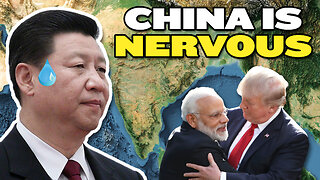 7:42
7:42
China Uncensored
13 hours agoIndia Has Surpassed China
42.9K16 -
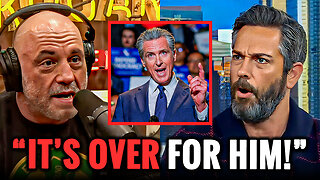 8:47
8:47
Hollywood Exposed
11 hours agoJoe Rogan and Zachary Levi DESTROY Gavin Newsom’s Lies About California
26.3K5 -
 2:09:50
2:09:50
BlackDiamondGunsandGear
5 hours agoInside NEW Glock V Models / Whats Next? / You giving up Glock?
30.9K2 -
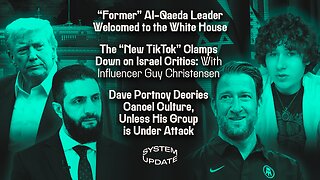 2:05:31
2:05:31
Glenn Greenwald
10 hours ago"Former" Al-Qaeda Leader Welcomed to the White House; The "New TikTok" Clamps Down on Israel Critics: With Influencer Guy Christensen; Dave Portnoy Decries Cancel Culture, Unless His Group is Under Attack | SYSTEM UPDATE #545
143K87 -
 7:30:07
7:30:07
Spartan
10 hours agoNine Sols
18.4K1 -
 2:34:56
2:34:56
SOLTEKGG
5 hours ago🔴 HUGE UPDATE - Veterans Day | Redbull x Dogtag Giveaway
16.9K1 -
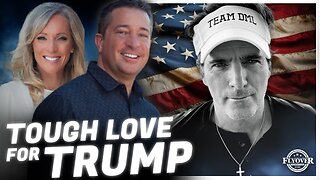 1:23:36
1:23:36
Flyover Conservatives
14 hours agoTough Love for Trump: What Must Change Now to Win Back America - Dennis Michael Lynch | FOC Show
26.8K5 -
 1:56:43
1:56:43
The White House
7 hours agoAbove, Below & Beyond: A Presidential Special
35K18